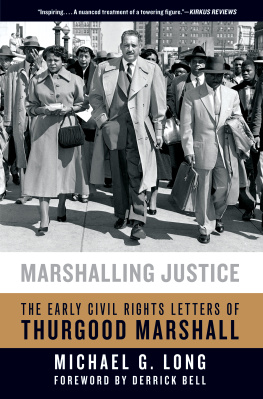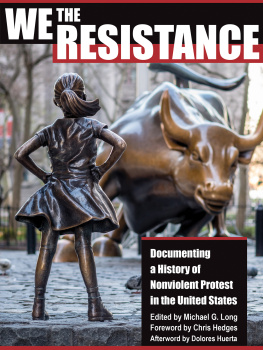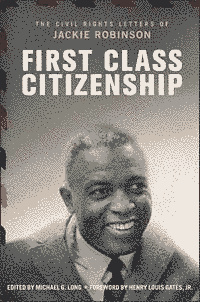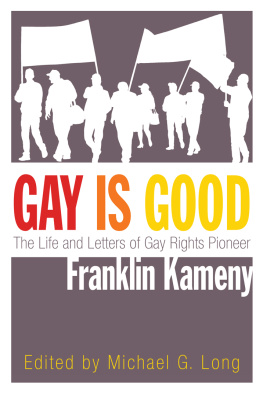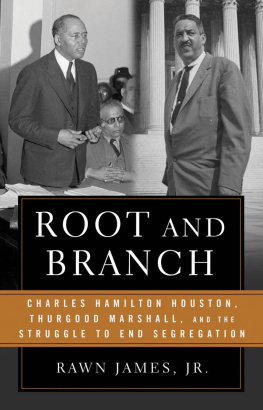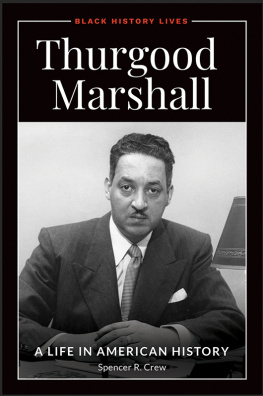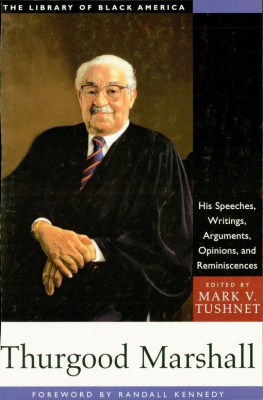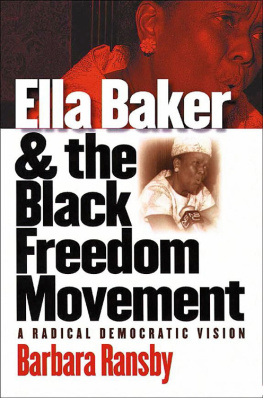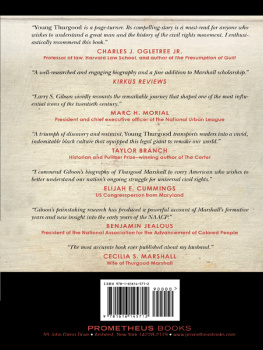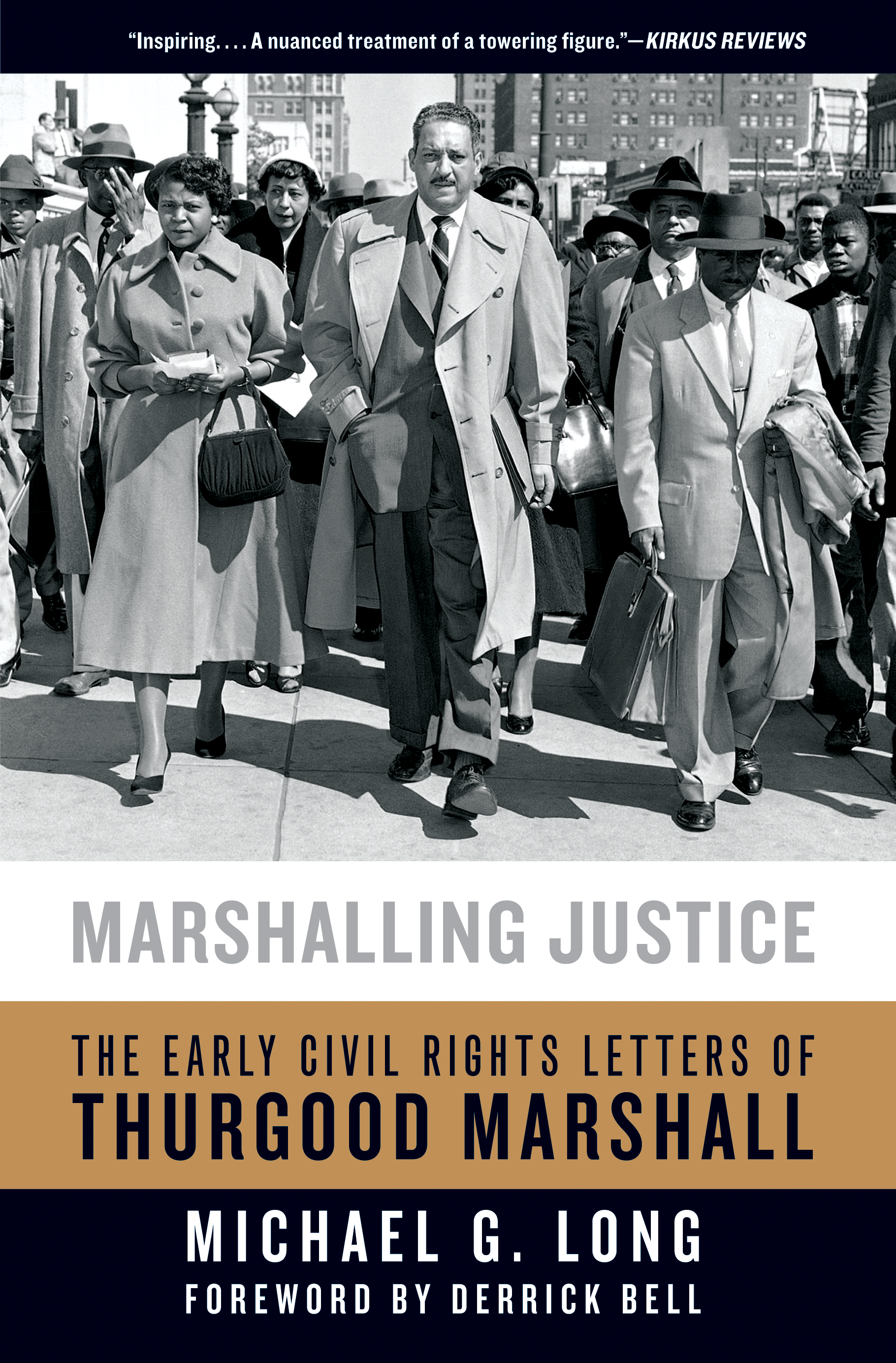
MARSHALLING
JUSTICE
The Early Civil Rights Letters
of Thurgood Marshall
E DITED BY M ICHAEL G. L ONG
Foreword by Derrick Bell

For Nate,
who loves to play
One of these days, we will make democracy work in this country.
THURGOOD MARSHALL
Contents
Far from Optimism
Derrick Bell
U njustified optimism in the face of unrecognized obstacles is an ideological hazard that has often afflicted advocates of racial justice. Currently, it is manifested in the view that Barack Obamas election to the presidency marks the beginning of the post-racial era. Manifestations of similarly unwarranted euphoria were expressed when Lincoln issued the Emancipation Proclamation in 1863. The expectation of a race-free America was predicted as certainty when the Supreme Court handed down its school desegregation decision in 1954. The Civil Rights Act of 1964 and the Voting Rights Act of 1965 also prompted grateful prayers by black people that our day had come. The assassination of Martin Luther King, Jr., in 1968 was too high a price to pay for the widespread adoption of affirmative action programs in the years that followed, but those programs were also deemed certain to curtail if not eliminate still viable racial discrimination across a wide spectrum of American life.
It is significant that in the letters Thurgood Marshall wrote from 1935 through 1940his early years as a civil rights lawyerhe rarely expressed optimism. This was the period when the lynching of black men and some women was carried out with an awful regularity and the perpetrators were never prosecuted, seldom even arrested. Segregation of public facilities, on a far from separate but equal basis, was required and protected by law. The courts could not be depended on to find even blatant violations of black rights worthy of relief. Marshall, barely paid enough to cover basic bills, handled a multitude of cases and causes, and much of this work is reflected in his letters to colleagues, clients, government officials, and business leaders.
Marshall was a fun-loving man who seemed to have remembered every story he had ever heard, but his letters were serious, and purpose-driven. His mission, seldom stated but readily apparent in his writing, was to confront discrimination wherever he found it. All too often, it was a confrontation without either legal or political power to back it up. It was out of this background that his lawyerly skills and tactics were nurtured and matured into the carefully constructed litigation that led fifteen hard-fought years later to Brown v. Board of Education .
There were early victories. In 1934, working with Charles Houston, the then lead NAACP counsel, he gained an order requiring the University of Maryland to admit Donald Murray, an Amherst graduate, as the first Negro admitted to its law school. Marshall helped shepherd Murray through the rigors of law school to graduation. Finding clients of Murrays character, though, was not easy. Similarly, the Montgomery County Board of Education in Maryland responded to Marshalls suit seeking equalization of teacher salaries by agreeing to his demands. He felt this victory could be pushed to equalize teacher salaries across the state, even the nation, but he ran into expected opposition from school superintendents claiming black teachers were inferior. Unexpected resistance came from some black communities that, pointing to a number of teachers who had been fired for taking part in the equalization campaign, felt Marshall and the NAACP campaign were not improving their lives but actually making them worse.
His early letters also chided President Roosevelt and United States senators for failing to support antilynching legislation, none of which was ever enacted. He wrote Southern governors urging them to investigate lynchings that transpired in their states, a painful obligation given the predictable response that there was no evidence upon which they could act. They ignored Marshalls offers of information gathered by courageous persons able to provide both details of the murders and the names of the murderers.
Many blacks sentenced to death were victims of legal lynching with juries willing to convict on even a scintilla of evidence. In one case, prior to writing a sorrowful letter to the mother of Oscar Perry, who had been condemned to death, Marshall wrote to a cooperating attorney who had unsuccessfully sought clemency for Perry:
It is this type of case which tends more and more to bring about a feeling that many of the courts in this country still prefer to permit prejudice to overcome a true sense of justice. However, we are sure that with the ever-growing group of individuals and lawyers in the South like yourself, who are willing to fight for justice, the battle is not lost and we still cling to the hope that eventually we will have justice in this country for all citizens.
Far from optimism, this was a balm for despair. It was an antidote that appeared in many of Marshalls letters. And yet his challenges to racial bias, as recorded in these letters, continued. He complained about a federal program of the TVA that introduced segregation policies in an area where blacks and whites had worked together. He sought the help of local lawyers to challenge the use of extradition processes to prevent the return south of blacks who had escaped from Southern chain gangs, returns that would likely end in their deaths.
Marshall wrote magazine editors who used racially derogatory stories and pictures. He even wrote to the head of Whitmans Candy for calling one of its products Pickaninny PeppermintsChocolate Covered. The picture on the box was a total stereotype of black children. The companys attorney responded that he was surprised that the word pickaninny was distasteful, thinking it referred to a cute Negro child. After a lengthy exchange of letters and attention from black newspapers, Whitman dropped the offensive name.
The banal complaints based on feigned claims of ignorance were far outnumbered by letters revealing just how bad life was for black people in the early decades of the twentieth century. Consider the tenant farmers and those held in peonagehardly different from slaverywho with no legal recourse were regularly cheated out of the products of their labor. Or the New Mexico school that because it had few Negro children felt justified in hiring just one black teacher to cover grades one through junior high school, all in one small building. Or the disenfranchised blacks in Texas. Marshalls organizing efforts there were eventually successful in challenging the white primary, which had effectively prevented blacks from taking part in the only election that counted in a state dominated by the Democratic Party.
From 1938, when his mentor, Charles Hamilton Houston, resigned as special counsel of the NAACP, to 1943, Marshall handled all the NAACP matters on his own or with the help of volunteers. The growing number of complaints from Negro soldiers required that he hire two lawyers that year, and it was in 1944 that he hired Robert Carter as his assistant. As he complained to the NAACP leaders Walter White and Roy Wilkins, Marshalls budget was, at best, minuscule. Over the years that followed and despite an impressive list of legal victories, money was always tight. When Marshall hired me in 1959, five years after the Brown v. Board victory, he had to stretch to meet the salary I was supposed to earn as director of the Pittsburgh NAACP branch. Even more amazing, I became only the fifth member of the Legal Defense Fund legal staff. As of early 1960, the staff consisted of Marshall, Jack Greenberg, Constance Baker Motley, James Nabrit, and me. Robert Carter had replaced Marshall as NAACP general counsel.
Next page
